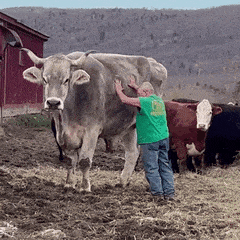- Ithaka
- Posts
- How to Change the Wind
How to Change the Wind
Try this next time you face a herd of charging elephants
In This Issue:
How to Change the Wind
Try this the next time you face a herd of charging elephants
Tools and Talismans
How to capture, organize and use everything.
Paolo Coelho’s productivity hack
A pep talk from Denzel Washington.
Feature: How to Change the Wind
I’m telling you this because it could happen to you.
Maybe not literally, but what’s the difference?
Thousands of years ago, a young farmer changed the course of history. The same way your own inner thoughts and ideas, the young ingenuous hero in you, can change the course of your history.
It happened in southern Italy, when two powerful forces were locked in a battle to the death.
Now, you might not be defending a village in Italy from looting and pillage, maybe not today anyway.
But how many inner struggles do you suffer as you strive for a better life, a better future, a better version of yourself?
The human mind, heart, and soul are eternal battlefields. Each one is littered with the corpses of failed dreams, shattered hopes, stifled wishes and lost opportunities.
So think of this historical legend as an allegory, if that helps. It’s really all about you, as it always was.
The Battle of Maleventum
On one side of the battle was the avaricious King Pyrrhus, who wanted to conquer the Italian peninsula and make it his own private monarchy.
Think of Pyrrhus as all the forces that block you from being the person you truly want to be. Think of Pyrrhus as all your fears and self-doubts, your inhibitions, and everything that restricts you from the inside.
And know that these oppressive forces can be beaten. People have been winning battles like this for thousands of years and are still winning every day. You can, too. (I bet you already have).

Gif by ayyuka on Giphy
Pyrrhus was about to crush his nemesis, the young Roman Republic.
At this point in history, we’re not talking about the corrupt and decadent Roman Empire that ruled on three continents. At this early stage, Rome was an influential city whose citizens were trying out new forms of democracy.
The truth is they owned slaves, oppressed women, and did a lot of bad things that would be unacceptable today. But for the time, their ideas of equality, tolerance, and individual freedom were radical, if not unprecedented.
Maybe you can relate. You’re not perfect. You’ve probably done some bad things. But you’re basically a good person, and you’re trying to grow. You’re standing up to Pyrrhus, a much worse and oppressive adversary.
Human history is never black and white, but if you take this symbolically, the story you’re about to hear is one more version of the epic struggle between good and evil.
And evil was winning.
Pyrrhus had a bigger army, more pig-headed determination to get his way, and a weapon that made him almost unbeatable: A score of battle-trained elephants.
He mowed down the volunteer soldiers of the Republic in four massive battles. Entire cities surrendered to Pyrrhus, and many of them joined his side.
At last, the Republic made a final stand in a place called Maleventum.
Changing the Wind
Now, Maleventum means “Evil Wind,” and it’s a dreadful name for a place where you have to fight for your survival.
But you may have noticed this whole story is called “Changing the Wind.” So you can probably guess how things turned out. (Especially if you’ve been to Italy!)
In the Roman Republic, only people who owned land served in the army. After all, why should you kill and die for your country if you don’t literally have some skin in the game?
Of course, the wealthiest families supplied the army with its generals, officers, and lieutenants. The land-owning foot soldiers were mostly farmers.
Fair or not, it turned out to be a good thing.
The legend goes that one young farmer/soldier couldn’t get his mind off the war elephants, which were the terror of Pyrrhus’ army.
As a farmer, he had experience with animals, and knew a thing or two about how to control a beast that is bigger than you.
In a stroke of genius, he thought of a plan to neutralize the war elephants. He made his move right when the charging elephants were practically upon him.
Now let’s step back for a second and think about this allegorically. You have your own creative genius inside of you. You have a unique background, with knowledge and personal experiences that are worth a lot more than you probably realize.
Like our young farmer, you have the answer within you. When you’re faced with a line of charging elephants (not literally), when your own inner Pyrrhus is trying to dominate you, that genius can come out and find a way.
To make a long story short, the answer at Maleventum was fire. There were watchfires and cooking fires all over the Roman camp.
Our young hero (who is really just a version of you) threw down his spear, broke ranks, ran to the nearest fire and pulled out a long tree branch with a mass of burning leaves at one end. He ran back and thrust this at one of the elephants.
The elephant turned and trampled the enemy’s soldiers. The farmer’s comrades saw this and grabbed anything they could set on fire. Rags, torches, olive oil…
The tide was turned. Pyrrhus set sail and never returned to Italian soil again.
In celebration, the name Maleventum was changed to Beneventum, which is “Benevento” in modern Italian, and it means “Good Wind.”
Now there’s one more thing I should tell you. You can change an evil wind into a good wind, transform your own Maleventum into a Benevenum, anytime you want. I have a process for doing this, which I’m going to share with you soon.
I heard this story at a gelateria in Benevento. The owner, who told me this story, gave me some encouraging advice that I’ll leave with you:
“There is always a watchfire.”
Tools and Talismans
How Paulo Coelho overcomes writer’s block (it works for other things, too)
A pep talk from Denzel Washington (cued to the most important part)
Want to capture, organize, and use everything you read, watch, or listen to? You need Billy Oppenheimer’s notecard system

